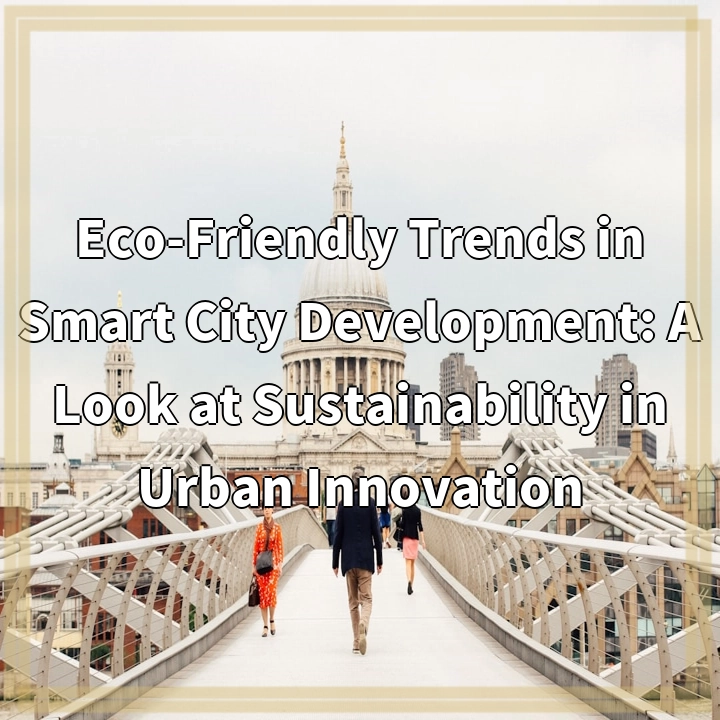
What is Eco-Friendly Trends in Smart City Development?
Eco-friendly trends in smart city development refer to the integration of sustainable practices and technologies in urban planning and design. It entails leveraging technological advancements to create cities that are not only efficient and convenient but also environmentally friendly and socially inclusive.
Real-World Problems Associated with Eco-Friendly Trends in Smart City Development
1. Cost and Affordability
Implementing eco-friendly technologies and infrastructure in smart city development can be expensive. From incorporating renewable energy sources to upgrading transportation systems, the initial investment required can sometimes be a significant barrier. Finding ways to make these technologies more cost-effective and enabling access for all socioeconomic groups is crucial.
2. Infrastructure Upgrades and Integration
Retrofitting existing cities with eco-friendly technologies can be challenging. It often requires substantial upgrades to infrastructure, including electric grids, waste management systems, and transportation networks. Ensuring a smooth integration of these systems while minimizing disruptions to city life is a complex task that city planners and policymakers must address.
3. Data Security and Privacy
Smart cities rely on a vast amount of data collection and analysis to optimize resource allocation and enhance sustainability. However, this raises concerns about data security and privacy. Safeguarding sensitive information and ensuring that data is used ethically and in accordance with privacy regulations are essential considerations in smart city development.
4. Social and Equity Considerations
As cities become smarter and more eco-friendly, it is crucial to prioritize social equity and inclusivity. Ensuring that sustainable initiatives benefit all residents, regardless of socioeconomic background, and mitigating any potential negative impacts on vulnerable communities is a challenge that should be addressed proactively.
5. Long-Term Sustainability and Scalability
Creating eco-friendly smart cities is not merely about short-term solutions but rather about long-term sustainability. While individual projects and initiatives may be successful, ensuring their scalability and long-term viability is essential. This involves considering the lifecycle of technologies, evaluating their environmental impact, and making provisions for future growth and evolving needs.

Solutions for Eco-Friendly Trends in Smart City Development
1. Innovative Financing Approaches
To address the cost and affordability challenges, cities can explore innovative financing approaches. This may include public-private partnerships, green bonds, grants, and subsidies to incentivize the adoption of eco-friendly technologies. By diversifying funding sources and exploring creative financial solutions, the economic barriers can be overcome.
2. Phased Implementation and Integration Planning
To address infrastructure upgrades and integration challenges, cities can opt for a phased implementation approach. This gradual and systematic approach allows for the seamless integration of eco-friendly technologies without causing disruptions to city operations. Proper planning and collaboration among different departments and stakeholders can ensure effective infrastructure upgrades.
3. Robust Data Security and Privacy Measures
To address data security and privacy concerns, cities must prioritize robust cybersecurity measures. Implementing encryption techniques, data anonymization, and transparent data governance practices can help safeguard sensitive information. Additionally, establishing clear policies and guidelines for data collection, storage, and usage can ensure responsible and ethical data practices.
4. Equitable and Inclusive Approach
Cities should adopt an equitable and inclusive approach to smart city development. This involves actively engaging with communities and considering their needs in the decision-making process. Offering affordable housing, accessible public transportation, and ensuring access to eco-friendly amenities are crucial steps towards creating a socially inclusive and equitable smart city.
5. Continuous Evaluation and Adaptation
To achieve long-term sustainability and scalability, continuous evaluation and adaptation are vital. Cities should regularly monitor the impact of eco-friendly initiatives and technologies, seeking feedback from residents and experts. This allows for necessary adjustments and adaptations that align with the evolving needs of the city and ensure the long-term success of sustainable smart city development.















